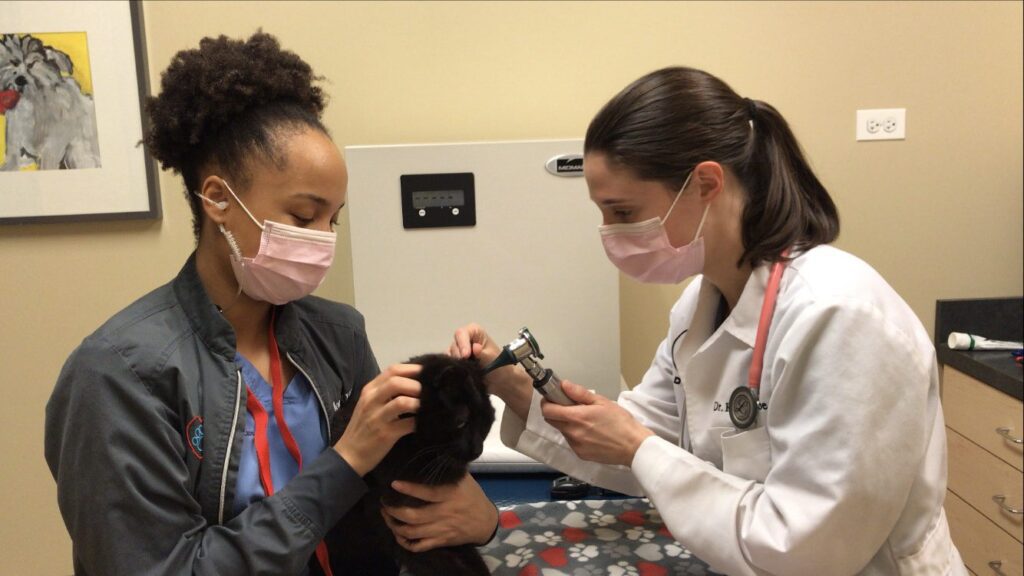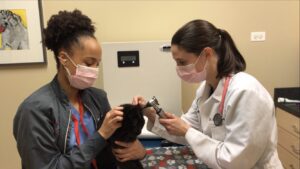COVID-19 (Coronavirus), Pets & People


COVID-19 IS A NEW VIRUS AND INFORMATION AND KNOWLEDGE ABOUT THE VIRUS IS CHANGING RAPIDLY. FOR THE LATEST INFORMATION ABOUT COVID-19, INCLUDING QUESTIONS REGARDING COVID-19 AND ANIMALS, PLEASE CHECK WITH THE UNITED STATES CENTERS FOR DISEASE CONTROL (CDC). THEY ARE BEST ABLE TO PROVIDE THE MOST UP-TO-DATE INFORMATION. www.CDC.gov
COVID-19 & Pets
By David Gonsky, DVM
Founder & Chief Veterinary Officer
West Loop Veterinary Care
At West Loop Veterinary Care, we strive to provide clients with timely and accurate information important for the care of their pets. The information provided below is accurate as of March 9, 2020. Information may change as we learn more, so please check for the latest news at www.CDC.gov.
Here are answers to some of the more common questions we receive about COVID-19 and pets:
Q: Can our pets get COVID-19?
A: The United States Centers for Disease Control (CDC), has NOT reported any cases of pets or other animals becoming sick with COVID-19 in the United States. That said, a pet dog in Hong Kong has repeatedly tested “weak positive” for COVID-19, which indicates a low level of infection. The dog’s owner had previously been reported to have COVID-19 and it is believed that the dog may have contracted the virus from its owner. The dog has shown no signs of illness from the virus. Health care professionals and veterinary professionals are uncertain as to the meaning of the positive test result from this one dog. Officials will continue to monitor and test the dog, which is being cared for in a quarantine facility in Hong Kong.
Q:Can pets spread COVID-19?
A: According to the CDC, the World Health Organization (WHO) and others, to date, there is no evidence that companion animals or pets can spread the virus.
Q: If a person has been exposed to COVID-19, are their pets at risk?
A: We don’t have enough information at this time for a definitive answer. Therefore, anyone who has been exposed to COVID-19 should monitor their pet(s) for illness as they are monitoring their own health.
Q: If a person has been diagnosed with COVID-19 and has pets, what should they do?
A: The CDC advises anyone with COVID-19 to tell their public health point of contact that they have pets or other animals in their home.
Additionally, the CDC says that people with COVID-19 who are identified by public health officials as requiring home care and isolation should maintain separation from pets and limit interaction with pets and other animals just as they would with other people.
Anyone diagnosed with COVID-19 should avoid the following interactions with pets:
- Petting
- Snuggling
- Being kissed by or kissing the pet
- Being licked by the pet
- Sharing food with pets.
The CDC suggests that when possible, a healthy household member should be designated to care for pets in the home. Service animals should be permitted to remain with their handlers.
If the individual in home care and isolation must care for pet(s), including service animals, they should:
- Thoroughly wash their hands before and after caring for pets
- Wear a facemask while interacting with pets
This practice should continue until they are medically cleared to return to normal activities. Pet owners should continue to monitor news about COVID-19 from the CDC (www.CDC.gov).
Q: If I have COVID-19 and my pet shows symptoms of illness, should I take my pet to my veterinarian or an emergency animal hospital?
A: If you have been exposed to or diagnosed with COVID-19 and your pet shows symptoms of illness, the pet should be isolated from other animals in the house and the owner should call their veterinarian or a veterinary emergency center. The owner should be sure to tell the veterinary facility of the potential or actual exposure to COVID-19. Pets exposed to COVID-19 should not be taken to a veterinary clinic or veterinary hospital without first calling and explaining the situation. The clinic or hospital may need to contact the state veterinarian or may want to utilize an isolation protocol in caring for the pet. This will help protect your pet from other potential contaminations and help reduce any risk to people and other animals.
At West Loop Veterinary Care, we may be able to provide you and your pet with a tele-medicine appointment to determine the best next steps. Regular appointment rates apply.
Q: In general, what steps can pet owners take to keep their pets healthy?
A: The best way to help pets fight off any potential illness or disease is to make certain that they have:
- Good nutrition
- Plenty of exercise
- See their veterinarian regularly
- Up-to-date vaccinations
- Protection from pests and parasites
We hope you and your pets remain safe during this outbreak of the COVID-19 virus. At this time, West Loop Veterinary Care continues to maintain our regular hours and provide regular services to our clients and their pets. We will update clients via our newsletter and Facebook page should the situation change. If you do not currently receive our newsletter and would like to be added to our mailing list, please send your email address with a request to be added to our newsletter list to: info@WestLoopVet.com.
Dr. David Gonsky
West Loop:
(312) 421-2275
Streeterville:
(312) 766-5959
